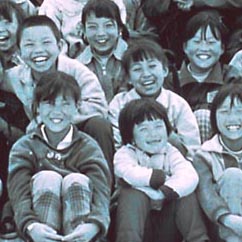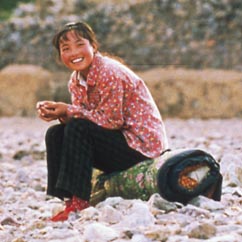Not One Less


After a brief respite from both Chinese language films and directing, acclaimed director Zhang Yimou (Shanghai Triad, Lumiere and Company) returns with Not One Less. This new film is much more accessible than some of his other films. It also tells a story that easily translates to other cultures. Strangely enough, though everything about Not One Less presents itself as a heartwarming story about love, there is an ugly undercurrent running through the movie that drags its message down. Shi Xiangsheng, author of the book by the same name, provides the screenplay.
A small town hires thirteen-year old Wei Minzhi to substitute teach in place of Teacher Gao. Gao must leave for one month to tend to his ill mother. The schoolhouse consists of one room, and the school, and everything else in the town, is poor. Wei is also poor, and initially accepts the job because of the money. She does not care about the children, and has no experience in teaching. Students are leaving the school in order to work to provide an extra source of income. As an extra incentive, Gao offers Wei extra money, if, when he returns, all of the children are still in school, and not one less. When one of the students, Zhang Huike, leaves to work in the city, Wei journeys there to try to find him and bring him back.
Wei's reasons are purely selfish, which is somewhat of a turnoff. Initially, she tries to find Zhang only to ensure she receives the extra money. Also, Zhang is a brat. He is the class troublemaker, constantly a thorn in Wei's side. Neither character engenders much sympathy from the viewer. Who cares if Zhang returns? The class is better off without him. Thankfully, sometime in the middle, Wei's reasons for searching change, becoming earnest. Zhang strove for accuracy in Not One Less, casting all amateurs in roles they play in real life. The young students are young students. The mayor is a mayor in real life. Television anchors, station managers, store clerks, and train station announcers all play the same roles in the movie as they play in real life. The entire cast use their real names in the film further blurring the line between fiction and reality. Zhang also placed hidden cameras on to his cast while filming in the city, to catch everyday people acting normally. Any sour taste is gone by the middle of the movie, making the rest heartwarming.